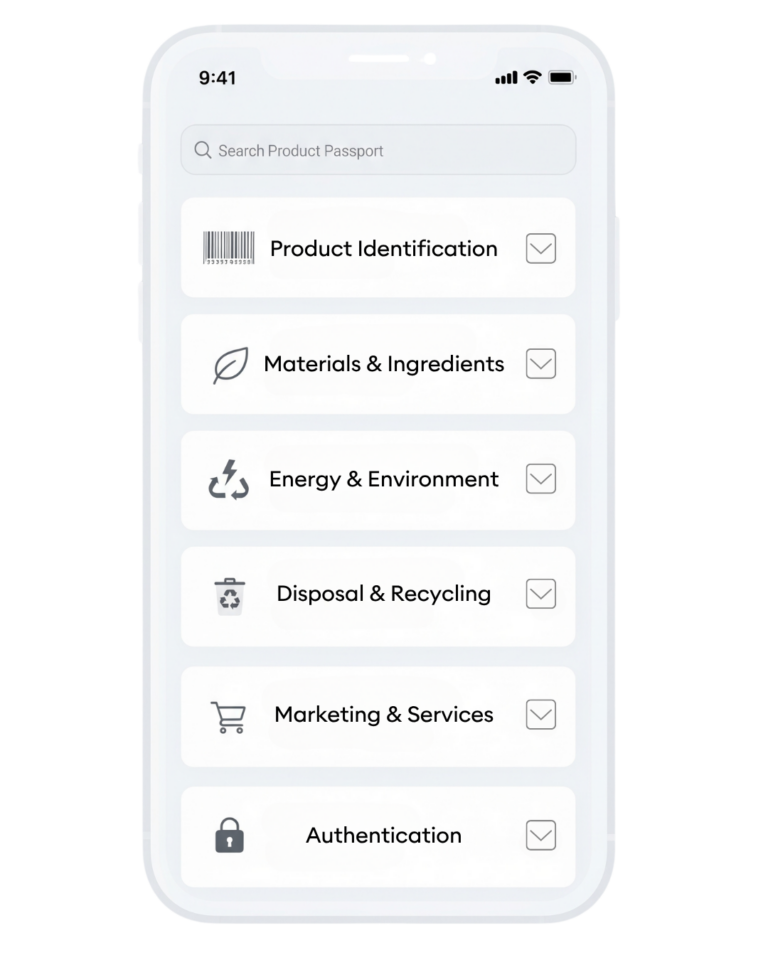Digital product passport
Digital Product Passport – Your New Key to Sustainable Market Success & Customer Loyalty
The EU digital product passport (DPP) not only creates transparency and compliance but also opens up a completely new digital touchpoint in the customer journey. Increase customer interaction, build trust, and boost brand loyalty.
What is the Digital Product Passport (DPP)?
The European digital product passport is a key component of the EU Green Deal and will become mandatory for many industries starting in 2027. Beyond transparency and sustainability, the DPP offers a crucial marketing advantage: it becomes a new digital touch point of contact with your customers—directly at the physical product. It’s relevant for B-to-C and B-to-B brands.
You can find more information on this regulation initiative from the official source: EU’s Digital Product Passport Advancing Transparency and Sustainability.
Understanding the EU Timeline
Start of ESPR
July 2024
The foundational legislation that sets the framework for the Digital Product Passport begins, marking the official start of the regulatory process.
First ESPR Product Regulations
January 2026
The first practical milestone where specific rules for certain products take effect, showing the regulation is moving from theory to implementation.
Battery DPP Mandatory
February 2027
A key, highly-publicized date for a specific, high-priority product. This serves as a concrete example of the DPP in action for the battery industry.
DPP for Textiles and Other Products
2027 (General)
The broader, general timeline for the DPP becoming mandatory for major industries, including the significant textile sector and other key product categories such as tires, steel, iron and alloy.
DPP Expands to Multiple Sectors
2028-2029
The DPP expands to cover furniture, cement, and mattresses, demonstrating that this is not a one-time change but an evolving regulation covering more sectors over time.
Circularity Passport for Vehicles
2032
The long-term vision milestone, showing the ultimate goal of creating a full "circularity passport" for complex products like vehicles.
A New Touchpoint in the Customer Journey
With the product passport, you create an additional, direct access point to your customers—anywhere, anytime.
Digital Touchpoints
Stronger Connection
Personalized Services
Brand Credibility
How Does the DPP Digital Product Passport Work?

Access Product Information
By scanning a QR code or RFID tag, users instantly access a product’s verified data. This includes details on its origin, materials, and environmental impact, providing a new level of transparency and trust. It must be permanently printed or attached to the product.
The DPP acts as a new digital marketing channel. It allows brands to integrate targeted cross-selling offers, deliver personalized content, and provide after-sales support directly to the customer.
Marketing & Service Integration
Real-time Updates
The DPP is a dynamic tool that enables real-time updates throughout a product’s lifecycle. This ensures customers always have access to the most current information, from updated repair instructions to new service offerings.
What Information Can the Digital Product Passport Contain?
- The manufacturer's home
- Unique serial number
- Model name
- Production date
- Complete list of all materials used
- Manufacturing information
- The origin of raw materials
- Information on recycled content
- A record of the production process
- Efficiency values and ecological impacts
- Energy consumption data
- Water usage
- Carbon footprint
- Other ecological metrics
- Disassemble
- Repair
- Recycle components
- Delivering personalized offers, cross-selling opportunities, and loyalty program details
- Providing comprehensive after-sales support with repair guides, warranty information, and direct support channels
- New touchpoint in the Sales Funnel and Service Interface
- User Manuals
- Brand Content
- CSR Content
- Chat Bot
- Promotions
- Demonstrate ownership certificate along with authenticity by the use of blockchain
- Protect against counterfeits
- Streamline warranty claims
- Provide a secure record of the product's history

Challenges & Opportunities for Companies
By viewing the Digital Product Passport (DPP) not just as a compliance requirement but as a strategic business tool, companies can transform potential challenges into significant competitive advantages.
Challenges
Data Management & Integration: The primary challenge lies in establishing robust and efficient data management systems.
Companies must seamlessly integrate vast amounts of data from diverse sources across the entire supply chain, including manufacturing, logistics, and material suppliers, to create a coherent and accessible digital passport.
Compliance & Data Protection: Navigating the complex landscape of the EU’s Ecodesign for Sustainable Products Regulation (ESPR) requires meticulous attention to detail.
Companies must not only ensure full regulatory compliance for each product but also implement stringent data protection measures to safeguard sensitive information and maintain customer trust.
Cross Functional Teams: IT, Data, Corporate, and Legal departments must ensure compliance. Marketing, Communications, and Sales ensure customer dialogue
Leverage and aggregate Data and Content from existing CSR and ESG-reporting’s (if companies are obliged to have it)
Opportunities
New Customer Interface & Marketing Channels: The DPP serves as a dynamic, direct customer interface that opens up new marketing possibilities.
Companies can use it to deliver targeted content, personalized promotions, and cross-selling offers, transforming a static product into a continuous communication channel that drives engagement and loyalty.
Competitive Advantage & Innovation Leadership: Early adoption of the DPP gives companies a significant head start. By proactively implementing sustainable practices and transparent data management, a company can position itself as an innovation leader and gain a competitive advantage in the market.
This also builds strong brand equity and prepares the business for future regulatory changes.
Our Consulting Services for Your DPP Success
Like Reply supports you holistically—with a focus on marketing and customer experience:
- Evaluation & Strategy: Development of your DPP and marketing strategy.
- Data Management: Evaluation, Analysis and preparation.
- Technology & Integration: Reviewing infrastructure and connecting to DPP solution provider.
- UX & Content: Creating compelling Marketing and Service content and UX for a convincing customer experience.
- Implementation & Testing: Fast, agile implementation for quick market entry.
- Compliance Consulting: Legally compliant and data protection focused.
Partner with Like Reply for a Future-Proof DPP Strategy
As experts in digitalization and customer experience, REPLY offers highly specialized Data Consulting and cross-industry project experience. We provide end-to-end support—from initial strategy to the operational implementation of an EU-compliant SaaS platform. Contact us to transform the DPP into an innovative touchpoint for your marketing and secure a competitive advantage.
Read our Blog
Frequently Asked Questions
What is the purpose of the Digital Product Passport (DPP)?
The Digital Product Passport serves two primary purposes: regulatory compliance and market differentiation. It provides transparent information about a product’s sustainability, origin, and lifecycle to meet EU requirements. At the same time, it creates a new digital communication channel for companies to engage customers, build trust, and offer personalized services directly at the point of sale or use.
Which industries does the digital product passport regulation affect?
The DPP will initially target key sectors identified by the European Commission, including electronics, batteries, textiles, and construction products. The scope is expected to expand over time. Our team at REPLY specializes in helping businesses across various industries prepare for these new regulations and leverage the DPP for competitive advantage.
How does the product passport benefit my customers?
Customers gain immediate access to comprehensive and verifiable information about the products they buy. This includes data on origin, environmental impact, recycling instructions, and repair guides. This level of transparency empowers customers to make more sustainable purchasing decisions and fosters a stronger sense of trust and brand loyalty.
How is the DPP different from a simple QR code on a product?
While the digital product passport is often accessed via a QR code or RFID tag, it is not just a link to a website. The DPP is a standardized, secure, and structured data set that contains verified information required by EU law. It acts as a digital twin for the physical product, integrating with your existing CRM and marketing systems to deliver personalized, dynamic content and a consistent brand experience throughout the product’s entire lifecycle.
Can the digital product passport EU be used for marketing and sales?
Absolutely. Beyond its role in compliance, the digital product passport is a powerful tool for marketing. It creates a direct touchpoint with the customer, enabling you to deliver targeted cross-selling offers, provide after-sales support, offer exclusive content, or collect valuable first-party data. It’s a key way to bridge the gap between your physical product and your digital brand world.


